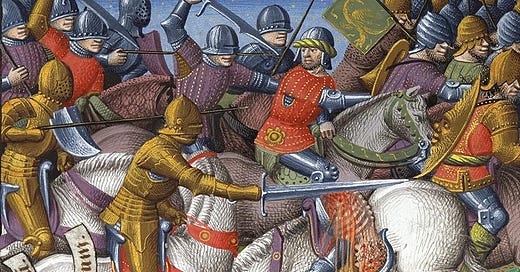If you are looking for the beginning of the study for The Song of Roland then you can go HERE for a brief introduction. At the bottom of the introduction you will find the links to each section of the study guide as it becomes available. If you would like to see the growing list of book studies available for free on this site you can go HERE. Enjoy!
Virtues/Vices/Great Ideas: (Find them in the Text)
Courage, Suffering, Truth, Fear, Justice
Grammar Questions: (The Information of the Text)
Who is the first among the French to meet the oncoming Paynim horde?
Initially how well does the Emir’s son, Malpramis, do in the battle?
What prizes did the Emir offer his men if they would but fight bravely?
Who puts an end to Malpramis’ slaughter?
What happens which requires Charlemayn to save Duke Naimon?
Which three Frenchmen fall by the hand of Baligant (the Emir)?
What bad news did the Paynim Jangleu bring to the Emir and what did he tell him would be the outcome of the battle?
Which Frenchman spoke very boldly to Charlemayn about the battle and what did he say?
What was the Emir’s response to seeing his Dragon “pennon cast away”?
What was the result of Baligant and Charlemayn’s joust with one another?
What conditions of peace were offered by Baligant and Charlemayn in the midst of their fight?
What brought Baligant and Charlemayn’s fight to an end?
How did Marsilion die?
What still remains to be settled now that the war with Paynims has been won?
Logic Questions: (Interpreting, Comparing/Contrasting, Reasoning)
The concept of hyperbole refers to making an exaggerated statement for the sake of emphasis but which should not be taken literally. What statement in Laisse 243 is an example of hyperbole?
What does the text mean when it says, “He learns what war is who fights that battle through”?
Why did the Emir become afraid when he saw his pennon cast away?
At one point the text says, “Paynim and Frank are now at swords throughout.” What does this statement indicate?
In the midst of the fight between Baligant and Charlemayn the text says, “Nothing at all can ever end the strife till one confesses he’s wrong, the other right.” What does this reveal about these two men?
Why did the angel Gabriel say to Charlemayn, “And what…art thou about, great King?” What did he mean by that?
Compare and contrast the actions of Emir Baligant and Emperor Charlemayn during the battle. What is similar and what is different about them? What should we infer about each of their characters from this reading?
Why did Charlemayn treat Queen Barmimond differently than the other Paynims whom he forced to convert?
Rhetoric Questions: (The Analysis of Ideas in the Text)
Carlon proclaimed to his men, “Justly, you know, I fight the infidel.” What is required for a war to be justified? Are just wars only defensive wars or are there instances when starting a war as the aggressor is justified? Explain your answer carefully and provide the rationale for your view.
Both the Emir and Charlemayn have men under their command who speak very directly and even harshly with them (Jangleu and Count Ogier) yet without fear of their lords doing them harm. What should we infer from this? How important is it as a leader to allow people under our charge to speak their mind openly and plainly? What are the dangers of allowing this and of not allowing this?
The text tells us that after the victory by the French “Then to the font the Paynim folk they drive” which indicates that they forced them to convert under threat of death. Are forced conversions to Christianity ever legitimate? Why or why not?
Theological Analysis: (Sola Scriptura)
Read Revelation 12. What does the imagery of “the dragon” represent in this passage? How should we connect this passage to our current reading in The Song of Roland?



